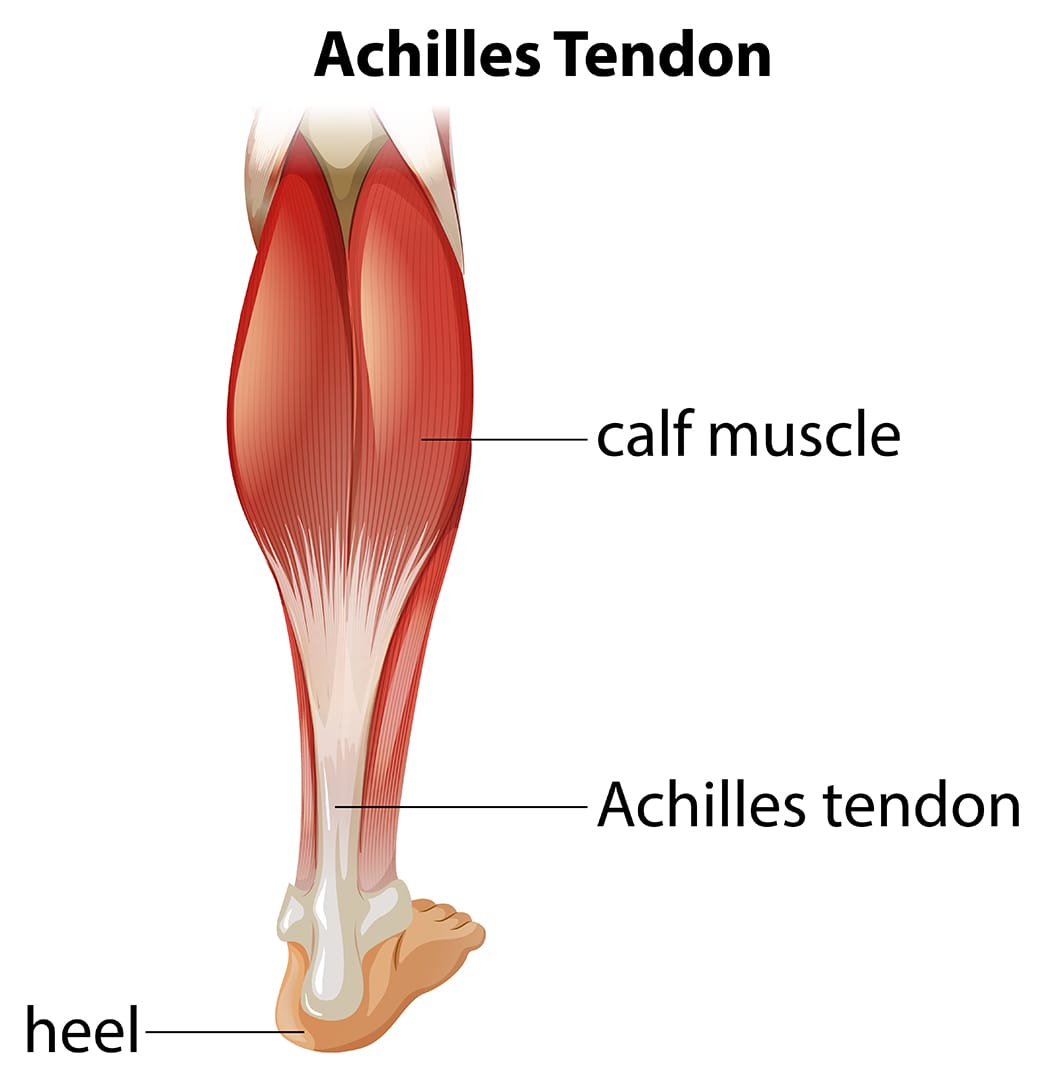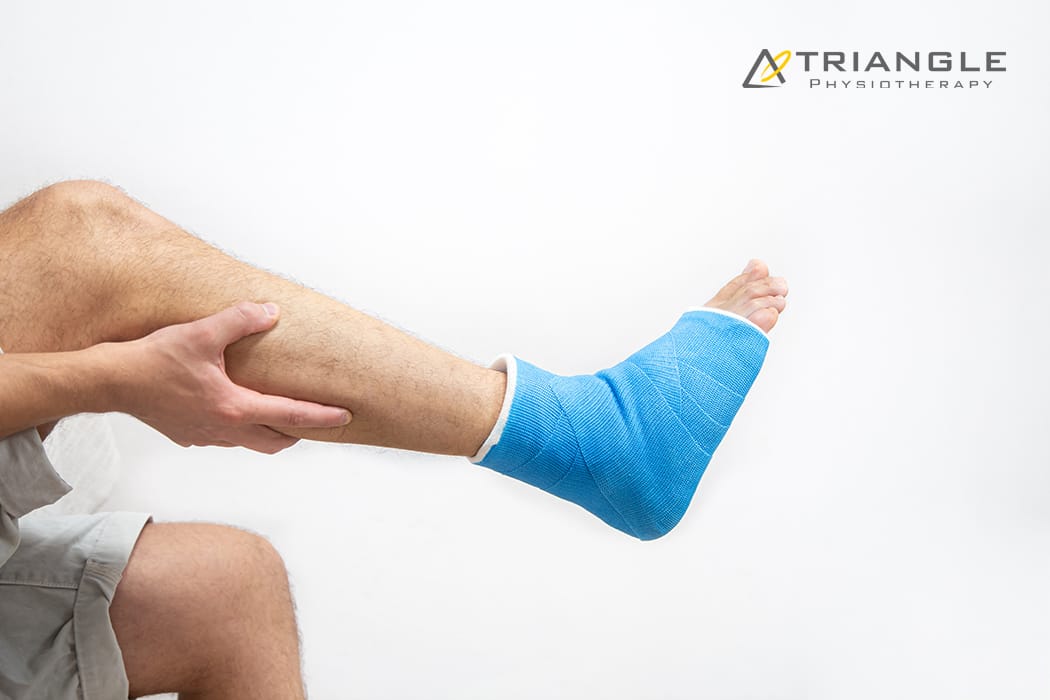If you have had achilles tendon repair surgery or are scheduled for a procedure, you are likely going to need post-surgery rehabilitation to recover completely. It is also advisable to do physiotherapy pre-surgery to maximize the outcomes of the surgery. This is also known as prehab or pre-surgery rehab. At Triangle Physiotherapy, our physiotherapists are skilled and experienced at helping their patients reach their optimal level of recovery. If you’re looking for expert guidance in post-surgery rehab near you or post-operative physiotherapy in Toronto, you’ve come to the right place.
Achilles tendon injuries are common, particularly among athletes and active individuals. The Achilles tendon, the largest and strongest tendon in the body, connects the calf muscles to the heel bone, playing a crucial role in walking, running, and jumping. When this tendon is torn or ruptured, Achilles repair surgery is often necessary. However, surgery is only the first step toward recovery. Effective rehabilitation is essential for restoring function, strength, and mobility. In this blog, we’ll guide you through the stages of Achilles repair surgery rehab, providing insights and tips to ensure a successful recovery.

Understanding Achilles Tendon Injuries
What is the Achilles Tendon?
The Achilles tendon is a band of fibrous tissue that links the calf muscles to the heel bone. It enables activities that involve pushing off the foot, such as running and jumping.
Common Causes of Achilles Tendon Injuries
- Overuse: Repetitive stress from activities like running can lead to micro-tears.
- Sudden Increase in Activity: Rapid changes in activity levels can strain the tendon.
- Trauma: Direct impact or sudden, forceful movement can cause a rupture.
- Age and Degeneration: As people age, tendons become less flexible and more prone to injury.
Achilles Repair Surgery
Goals of Surgery
- Reattach the torn ends of the tendon.
- Restore the tendon’s length and tension.
- Enable the patient to return to their pre-injury level of activity.
Tips for a Successful Rehab
- Consistency: Adhere to the rehab program and attend all physiotherapy sessions.
- Listen to Your Body: Avoid pushing through pain; inform your therapist of any discomfort.
- Nutrition: Maintain a balanced diet to support tissue repair and overall health.
- Patience: Recovery takes time; focus on gradual progress rather than rushing the process.
Rehabilitating after Achilles repair surgery is a structured and multi-phased process that requires dedication and guidance from skilled physiotherapists. At Triangle Physiotherapy, we are committed to providing personalized rehabilitation programs to ensure our patients achieve optimal recovery and return to their active lifestyles. If you’ve undergone Achilles repair surgery or are scheduled for one, contact us to learn how our expert team can support you through every step of your recovery journey.
For those searching for physiotherapy in Toronto, post-surgery rehab in Toronto, or post-operative physiotherapy in Toronto, we offer comprehensive services tailored to your needs.
For more information or to schedule an appointment, or call us at 416.203.8622. Let us help you get back on your feet stronger and healthier.
“Recovering from Achilles repair surgery requires expert care and guidance. Triangle Physiotherapy offers comprehensive rehabilitation services at several locations across the GTA. Visit our clinics for Physiotherapy in Etobicoke, Oakville, North York, Toronto, Lawrence Park, Queens Quay, Erin Mills, Mississauga, and Liberty Village to ensure a smooth and effective recovery journey with the help of our specialized physiotherapy team.”
Spinal fusion surgery is a medical procedure used to permanently join two or more vertebrae in the spine, eliminating motion between them. The goal of the surgery is to reduce pain, correct deformities, or improve stability in the spine.
When would I need Spinal Fusion Surgery?
Spinal fusion surgery is typically recommended for various spine conditions, including:
- Degenerative disc disease: When the discs between vertebrae break down, causing pain.
- Spondylolisthesis: When one vertebra slips forward over the one below it.
- Spinal stenosis: Narrowing of the spinal canal, leading to nerve compression.
- Scoliosis: Abnormal curvature of the spine.
- Fractures: Vertebrae that are broken or dislocated.
- Tumors: Removal of tumors that affect spinal stability.
- Infections: Infections that have caused damage to the vertebrae.
When do I start physiotherapy after surgery?
The timing of when to start physiotherapy after spinal fusion surgery depends on several factors, including the specifics of the surgery, the patient’s overall health, and the surgeon’s recommendations.
What does post-surgery rehab involve?
Immediate Postoperative Period (0-6 Weeks)
- Initial Phase: Physiotherapy may start in the hospital within a day or two after surgery. The focus is on gentle movements and exercises to improve circulation and prevent complications.
- Activities:
- Breathing exercises to prevent lung complications.
- Gentle leg movements like ankle pumps to improve blood flow.
- Log rolling technique for safe movement in and out of bed.
- Short, frequent walks to promote circulation and reduce stiffness.
Early Rehabilitation Phase (6-12 Weeks)
- When: Typically, more structured physical therapy begins around 4 to 6 weeks after surgery, depending on the surgeon’s assessment.
- Goals: Gradually increase mobility, start gentle strengthening exercises, and improve functional movements.
- Activities:
- Range of motion exercises.
- Gentle strengthening exercises for the core and lower extremities.
- Walking programs to gradually increase distance and duration.
- Education on proper body mechanics and posture.
Late Rehabilitation Phase (3-6 Months)
- When: Around 3 months post-surgery, assuming there are no complications.
- Goals: Restore full function, enhance strength and endurance, and improve posture and body mechanics.
- Activities:
- More advanced strengthening exercises using resistance bands or light weights.
- Low-impact aerobic exercises like swimming or cycling.
- Balance and coordination exercises.
- Functional training for daily activities.
Long-Term Rehabilitation Phase (6-12 Months)
- When: After 6 months, the patient should continue with physiotherapy based on individual progress and goals.
- Goals: Achieve optimal strength, flexibility, and functional ability, and prevent recurrence of symptoms.
- Activities:
- Progressive resistance training.
- Gradual reintroduction of higher-impact activities, if appropriate.
- Sport-specific training for athletes.
- Ongoing education on maintaining spine health.
Key Points to Consider
- Surgeon’s Recommendations: Always follow the specific guidelines and timelines provided by the surgeon, as they know the details of the surgery and individual patient needs.
- Listen to Your Body: Avoid pushing through pain. Pain is a signal that something might be wrong, and it’s important to communicate any discomfort to the physiotherapist or surgeon.
- Individual Variation: Each patient’s recovery is unique. Factors such as age, overall health, and the complexity of the surgery will influence the timing and intensity of physiotherapy.
Starting physiotherapy at the right time is crucial for a successful recovery, and adhering to a structured rehabilitation program can significantly enhance outcomes after spinal fusion surgery.
Click here to book an appointment for post-surgery rehab with a physiotherapist at one of our eight locations.
- Physiotherapy Etobicoke – Triangle Physiotherapy Etobicoke
- Oakville Physiotherapy Clinic – Triangle Physiotherapy Oakville
- Physiotherapy North York – Triangle Physiotherapy North York
- Mississauga Physiotherapy Clinics – Triangle Physiotherapy Mississauga
- Downtown Physiotherapy Clinics – Triangle Physiotherapy King West
- Uptown Physiotherapy Clinics – Triangle Physiotherapy Lawrence Park
- Physiotherapy Clinic Downtown Toronto – Triangle Physiotherapy Queens Quay
- Physiotherapy Clinics Mississauga – Triangle Physiotherapy Erin Mills
General Information: The information provided on this blog is for general informational purposes only. While we strive to ensure the accuracy and relevance of our content, we make no guarantees about the completeness, reliability, or accuracy of the information.
Not Professional Advice: The content on this blog does not constitute professional advice. It is not a substitute for professional medical, legal, financial, or other professional advice. Always seek the guidance of a qualified professional with any questions you may have regarding your specific situation.
Recovering from spinal fusion surgery requires careful physiotherapy to restore mobility and strength. Whether you need physiotherapy in Etobicoke, Oakville, North York, Toronto, Lawrence Park, Queens Quay, Erin Mills, Mississauga, or Liberty Village, there are expert physiotherapists available to guide your recovery journey and help you regain your quality of life.



